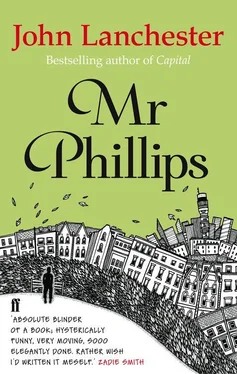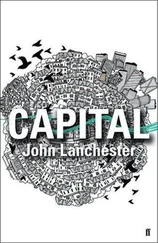‘Cheerio,’ says the man. ‘I’m sorry you lost your job. You’ve got my number. Give me a call if you want to have another chat, or if you have any ideas for magazines.’ As Mr Phillips wanders away he calls after him, ‘And thanks for your input on the tennis thing.’
Mr Phillips stands on Chelsea Bridge and looks down at the Thames. Across the road, next to the ruins of Battersea Power Station, a man tied to an enormous rubber band is jumping from a crane.
Presumably the less safe you felt in your everyday life, the less need you had for ‘dangerous sports’. They hold no appeal whatsoever for Mr Phillips. You would have to see gravity as a joke or as a benign force or at the very least as something you could trifle with, play games with, not take too seriously — whereas all that Mr Phillips has to do is look downwards, at his sagged and weighted flesh, to feel differently.
The man falls with his body held in a dramatic cruciform shape, initially accelerating at thirty-two feet per second per second, beginning to slow when the band goes taut after a drop of about eighty feet, then slowing further until he comes to a momentary stop another fifty feet further down; and then the rubber coils and scrunches as the man bounces back upwards, and the cage at the end of the crane comes down to collect him. It makes Mr Phillips feel funny even to look at it. How often are there accidents? The unspoken possibility of seeing someone’s death must be part of the appeal, as for the spectators at car races or air shows. A hundred thousand people go to see the British Grand Prix at Silverstone every year, paying £95 each. It’s a great, though unnecessary, compliment to death.
Mr Phillips suffers from, not vertigo, but the thing that makes people unable to stand next to a height without imagining jumping or falling off it. It is as if the idea of this kind of suicide presses in on him whenever he stands in a high place. And Chelsea Bridge is the sort of elegant suspension bridge he can imagine choosing for that final jump. Why on earth would anyone throw themselves under a train when they could chuck themselves off a bridge instead?
Granted, the fall from here might not kill him, even though water is harder the faster you hit it — for some reason Mr Phillips once heard on a TV science programme but could feel himself forgetting even as he was listening to it. Say it’s 100 feet up, with the tide at this lowish ebb. At 32 feet per second per second, that’s 32 + (32 + 32) = 96 = 2 seconds at a climactic speed of 64 feet per second. You multiply by 15 and divide by 22 to get miles per hour which comes to 43 miles per hour, so if it is true that hitting water at speed is like hitting concrete you would be hitting concrete at 43 miles per hour, which ought to do it. But there are other, more certain places. Clifton Bridge, another elegant piece of suspension work, is 250 feet which would take 4 secs, which means that you would in theory hit at 32 + 32 + 32 + 32, which is 128 feet per second, which is 87 miles per hour, which would certainly do it. It’s worth remembering that in practice you can’t fall any faster than terminal velocity, which for a human being is about 130 mph which is, history shows, fast enough. Beachy Head, another popular spot, 535 feet, 5.6 seconds, close to terminal velocity. Severn Bridge, another classic, 200 feet, 3.6 seconds.
They say that you have a moment of fear and then you go all calm, or even pass out. But how on earth do they know that? And of course you would be beyond fear anyway, to do it in the first place. Otherwise the thought of your shins being driven upwards into your pelvis would put a stop to it. The moment of contact, however quick, must surely leave you with a split second of awareness of what was happening. It was like the guillotine, there had to be a fraction of a second while the head knew it was leaving the body. Even if the fall didn’t kill him, the cold Thames, flowing far more powerfully and faster than anyone could swim, certainly would. Unless he went in at the turn of the tide, or landed on a boat that was carrying something soft on top or had a big canopy. What an idiot you would feel if that happened! You would have to come up with something really good to pacify the amazed bargemen. I was just looking at the paintwork and next thing I know here I am. Sorry for any alarm or inconvenience. I expect you get quite a lot of this. You couldn’t drop me off at the next pier by any chance? Or, not going too far, I hope? Jolly good, I’ve never been to Amsterdam. They say the red light district is quite something!
Mr Phillips stands and looks down at the water for what feels like a long time.
Mr Phillips is not a well-informed bus passenger, and the only route he knows well is his standard one from Waterloo to the office. As he waits at the bus stop beside Chelsea Bridge he has no particular plans about where he wants to go. Whatever comes along first and has seating room will be fine with him. The only other aspiring passenger is a middle aged Caribbean woman in an unseasonal brown mackintosh; she looks a little like the people who come to the door in Wellesley Crescent on weekend evenings selling copies of the Jehovah’s Witness newspaper. Mr Phillips thinks about getting his own reading matter out of the briefcase but before he can do anything about it a double decker bus appears.
It is one of the modern buses where you get on at the front and give your money to the driver; much slower and harder to love than the old Routemasters with the conductor. The new ones must be cheaper to run, though — less manpower. The world looks different, more fragile, when you have in mind that everyone everywhere tries to employ as few people as possible. Mr Phillips had always been impressed by the way conductors used to know exactly who had got on and off and who hadn’t paid their fare, as if they had a constantly updated map of the bus in their heads. On the occasions he tried to sit still and not admit to not having paid he always found a conductor hovering at his shoulder demanding the fare. Perhaps they were trained to detect guilty body language. If a bus conductor’s wife cheated on him he would know within seconds of getting home.
Mr Phillips climbs on to the step of the bus behind the supposed Jehovah’s Witness. He has a good view of her big, strangely high bottom. She peremptorily flashes a bus pass at the driver. Simultaneously, as if the sight has put the thought of money in his mind, he realizes that he has no coins. His ticket from Clapham Junction to Waterloo has cleared him out of change. Mr Phillips fishes his wallet out of his jacket pocket, takes out a £10 note and says:
‘I’m sorry about this.’
The driver looks at the note, where it sits in the little metal dish by his compartment.
‘You’re winding me up,’ he says without moving. The bus thrums loudly at its standstill.
‘I don’t mean to. I just don’t have any change,’ says Mr Phillips.
‘You’d like me to believe that, wouldn’t you?’ says the driver.
‘Is my money not good enough for you?’ says Mr Phillips, consciously choosing to go over to the attack.
‘What was that jingling sound when you got on?’ demands the driver. ‘You’ll tell me it’s your keys. That’s what you lot always say.’
‘I don’t have a “lot”. I have ten pounds,’ says Mr Phillips.
The driver looks at him without speaking for a few seconds. Then, apparently without any exertion on his part, a cascade of coins falls into a second metal dish below the first one. The driver reaches out and takes the note between thumb and first finger with an air of aggrieved delicacy. There is a chattering sound and a printed ticket extends itself from a slot.
Читать дальше




![Unknown - [Carly Phillips] The Bachelor (The Chandler Brothe(Bookos.org) (1)](/books/174132/unknown-carly-phillips-the-bachelor-the-chandle-thumb.webp)







